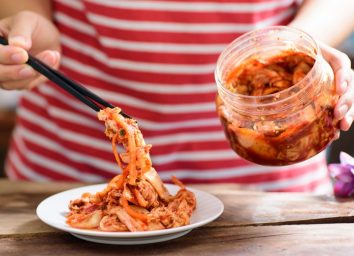4 Eating Habits That Slow Your Metabolism After 50, Say Dietitians

Our bodies naturally slow down as we age, regardless of how old we are. No matter who tells you otherwise, in your 50s, you are still young and young at heart. However, you’ll start to see some changes to your body that are inevitable. A slow metabolism—the process your body goes through when converting foods and drinks into energy—is one of those things that you can’t escape.
Even if your body currently processes food and drinks fast, what you eat and drink will eventually catch up to you. If you do not keep up with a healthy lifestyle such as a good diet and exercise, your metabolism will no longer help you out. Due to this, you could experience potential weight gain. If you’re beginning to experience a slow metabolism, take a look at these eating habits that don’t help the process. Then, be sure to check out 15 Warning Signs Your Metabolism is Slower Than It Should Be.
You follow a restrictive diet.

If you’re following a restrictive diet, it means you could be cutting out too many calories.
“If you are not eating enough, your body can slow its metabolism to accommodate,” says registered dietitian on our medical expert board Lauren Manaker, MS, RDN, LDN, CLEC, CPT, author of The First Time Mom’s Pregnancy Cookbook, The 7 Ingredient Healthy Pregnancy Cookbook, and Fueling Male Fertility. “Eating too few calories every day can especially exacerbate a slow metabolism.”
One of the most common mistakes that can slow your metabolism is thinking that you need to starve and eat fewer calories to lose weight,” says Lisa Young, PhD, RDN, author of Finally Full, Finally Slim, and nutritionist in private practice.
Dr. Young also always recommends that people eat at least 1200 calories a day to avoid eating too little.
You’re not eating enough iodine.

Iodine is a mineral often added to products like salt. It is also important for healthy thyroid function, which is the gland that regulates metabolism.
“Not getting enough iodine can cause your metabolism to slow,” says Manaker. “One of the simplest ways to include iodine in your diet is to opt for iodized salt. Seaweed is a great source of iodine too.”
Other iodine-rich foods include yogurt and seafood (especially cod).
You’re skipping meals.

Generally speaking, skipping meals comes with a lot of negative consequences.
“Many people think that skipping meals will help them lose weight. Actually, the opposite is true,” says Dr. Young. “Skipping meals can slow down your metabolism especially as you age, making it harder to lose weight.”
Eventually, skipping a meal can also lead to overeating later on, feeling as if you’re compensating for not eating earlier. Your body will also crave more junk food and processed food, leading to weight gain as well.
You’re not drinking enough fluids.

By fluids, we mean the healthy ones. Consuming too many unhealthy beverages like alcohol or sugary drinks can lead to excessive weight gain, not boasting well for your metabolism.
“Maintaining hydration can have a profound impact on your metabolism,” says Manaker. “Making sure that you are drinking enough water can help keep your metabolism in check while also helping you feel your best.”









